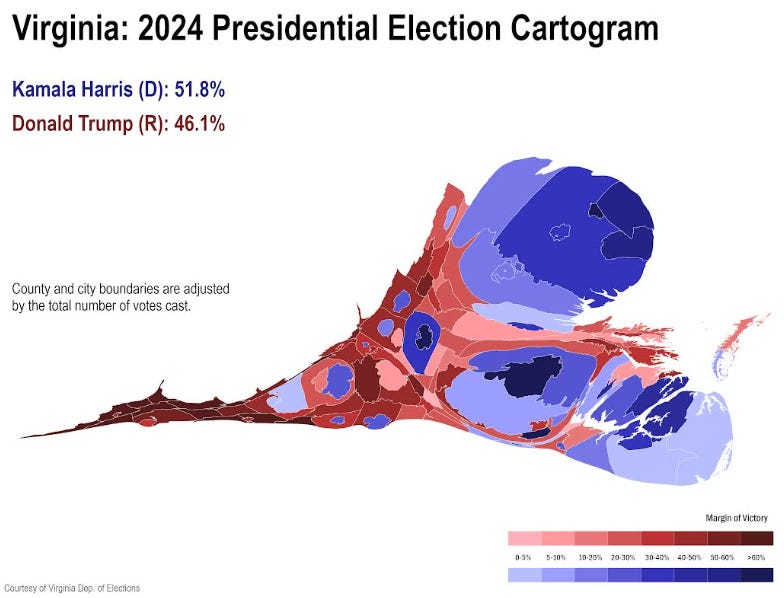Virginia Gubernatorial Preview
The contest for governor is set. Unlike four years ago, it's Republicans facing headwinds as we race toward November.
By Stephen J. Farnsworth and Anders Barretta
COMMENTATORS
Republicans seeking to win the Virginia gubernatorial election this November certainly have been making things harder for themselves.
Washington Republicans often complicate gubernatorial election years for their fellow partisans, and this year is no exception. In the past, Virginia Republicans faced congressionally debated — or mandated — federal government shutdowns and cutbacks. But none of these past hurdles can compare to the impacts of President Donald Trump’s sweeping cutbacks, market-rattling tariffs, and widespread economic uncertainty of federal workers and contractors this year.
Hundreds of thousands of Virginia-based federal workers and federal contractors, as well as their families, are not likely to thank Trump’s fellow Republicans for taking away jobs or threatening to do so in the coming weeks. The cutbacks so far, and the possibility of more yet to come, also hurt local businesses that provide goods and services to those workers, be they restaurants, appliance stores or other retailers. People working in sectors of the economy with a brisk export business, including agriculture and manufacturing, also face increased concerns about financial uncertainty as tariff rates skyrocket. Retirees — and those hoping to retire someday — feel the pain of the suddenly shrunk 401K accounts as the markets react to Trump’s tariff policies
People facing such profound economic anxieties will cut back — and blame the party in power — for their discomfort. As the national Democrats learned last year, that’s not a good backdrop for an election.
Angry voters are more likely to turn out, and voters mad at the status quo in Washington usually have the advantage in Virginia’s odd-numbered election years. Four years ago, voters turned thumbs down on the Biden administration, irritated by economic shortcomings and rising inflation. In 2021, Republican Glenn Youngkin was elected governor without having to campaign as a MAGA candidate. This year, with Republicans controlling all the branches of the federal government, Republican candidates in Virginia are facing much stronger headwinds than he did.
Former U.S. Rep. Abigail Spanberger, the Democratic Party uncontested nominee for governor, is no pushover for Republicans. She is a formidable opponent, with a decidedly centrist policy record, an extensive national security background, and an electoral record of doing better in more conservative precincts than Democrats. Because she faced no primary opponent, she did not have to woo doctrinaire liberals in a competition for her party’s nomination — so she can retain all her campaign resources for the general election contest to come.
The ballot access question also contained some good news for Republican Lt. Governor Winsome Earle-Sears, who also will not face a party primary this spring. Since neither of her potential rivals qualified for the party ballot, she will not have to endure a Republican gubernatorial nomination contest that would have focused on which candidate is the most pro-Trump.
Virginia’s current political environment is not one where Republicans can easily absorb the many difficulties that have emerged in recent months. Consider, for example, the accompanying cartogram that provides a visualization of the 2024 presidential election in the Commonwealth. A traditional map measures acreage, while a cartogram is adjusted to account for the number of voters in a jurisdiction. Traditional maps overestimate Republican strength given the large geographic size of red counties in Virginia. But people vote, and acres do not.
As a result, the deep red but somewhat sparsely populated areas of southwest Virginia become tiny, while the population centers of northern Virginia, Greater Richmond, and Hampton Roads swell to account for their larger electorates.
The illustration is yet another example of the challenges facing Virginia Republicans this year. There is little margin for error for the party, to be sure.
Given the unfavorable terrain, Virginia Republicans need a tailwind, not a series of headwinds. A strong opponent, a president generating economic uncertainty and increasing resistance from the opposing party, and policies that target the livelihood of Virginia’s federal employee-rich communities, are exactly the opposite circumstances of what Republicans would wish for headed into this year’s gubernatorial election. But the lack of a gubernatorial primary is a rare bit of good news for the party.
Stephen J. Farnsworth is professor of political science at the University of Mary Washington, where he directs the Center for Leadership and Media Studies. Anders Barretta is a senior political science and geography double major at UMW.
Local Obituaries
To view local obituaries or to send a note to family and loved ones, please visit the link that follows.
Support Award-winning, Locally Focused Journalism
The FXBG Advance cuts through the talking points to deliver both incisive and informative news about the issues, people, and organizations that daily affect your life. And we do it in a multi-partisan format that has no equal in this region. Over the past year, our reporting was:
First to break the story of Stafford Board of Supervisors dismissing a citizen library board member for “misconduct,” without informing the citizen or explaining what the person allegedly did wrong.
First to explain falling water levels in the Rappahannock Canal.
First to detail controversial traffic numbers submitted by Stafford staff on the Buc-ee’s project
Our media group also offers the most-extensive election coverage in the region and regular columnists like:
And our newsroom is led by the most-experienced and most-awarded journalists in the region — Adele Uphaus (Managing Editor and multiple VPA award-winner) and Martin Davis (Editor-in-Chief, 2022 Opinion Writer of the Year in Virginia and more than 25 years reporting from around the country and the world).
For just $8 a month, you can help support top-flight journalism that puts people over policies.
Your contributions 100% support our journalists.
Help us as we continue to grow!
This article is published under Creative Commons license CC BY-NC-ND. It can be distributed for noncommercial purposes and must include the following: “Published with permission by FXBG Advance.”














